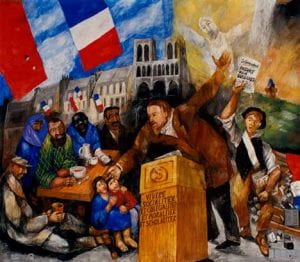 Today, most of us are familiar with the concept of systemic and structural change. In the context of 17th Century France, however, in which Saints Louise and Vincent lived, the idea of systemic change had yet to be developed. Instead, during this period, any efforts to improve the situation of those living in poverty tended to focus on solving the immediate material needs of the person in front of you. Given this context, the contributions of Vincent and Louise were notable and ground-breaking for their time in the way they went beyond addressing the immediate demands posed by poverty, to the level of organizing charitable efforts at a structural level. Not only did their labors lead to more effective and efficient forms of service delivery but they continue to shape the professions of health care and social work centuries later.
Today, most of us are familiar with the concept of systemic and structural change. In the context of 17th Century France, however, in which Saints Louise and Vincent lived, the idea of systemic change had yet to be developed. Instead, during this period, any efforts to improve the situation of those living in poverty tended to focus on solving the immediate material needs of the person in front of you. Given this context, the contributions of Vincent and Louise were notable and ground-breaking for their time in the way they went beyond addressing the immediate demands posed by poverty, to the level of organizing charitable efforts at a structural level. Not only did their labors lead to more effective and efficient forms of service delivery but they continue to shape the professions of health care and social work centuries later.
If we fast-forward two centuries to 19th Century France, a deeper appreciation of the world as a complex interrelated system was evolving. It was during this time that Frederic Ozanam, a 20-year old student studying at the Sorbonne, was one of the principle founders of the Society of St. Vincent de Paul in 1833. Ozanam helped recruit students for this lay Catholic organization to serve the poor in the slums of Paris, and at the same time regenerate French society to create a more just world. Indeed, after years of revolution and at the dawn of industrialization, Ozanam’s vision was to create “a community of faith and works erasing little by little the old divisions of political parties and preparing for a not-too-distant future a new generation which would carry into science, the arts, and industry, into administration, the judiciary, the bar, the unanimous resolve to make it a moral country, and to become better themselves in order to make others happier.”[1]
Thus, during this period, even though the terms systemic change and systemic thinking were not yet in common parlance, Ozanam’s ideas were infused with the seeds of such concepts. Indeed, for this Vincentian family member, if solutions for poverty were to be found, both individual lives and societal forces had to be transformed.
Today the Society of St. Vincent de Paul continues on a global scale. It is currently comprised of more than 800,000 members in 153 countries. While the Society has grown and changed over the years, its mission has not: to serve those on the margins, and shape a more just and compassionate world.
In 2006, Reverend Gregory Gay, C.M., then Superior General of the Congregation of the Mission, founded a Commission to promote systemic change as a way to end poverty, building upon the strong Vincentian foundation dating back to the time of Vincent and Louise. He called all members of the Vincentian Family to engage in strategies to help end poverty through systemic change as an essential dimension of living out Vincentian virtues and values in today’s context.
In light of this call and reading the signs of the times in our world today, how might you be hearing a similar call in your professional work at DePaul or in your personal life to improve the larger systems that impact the lives of those who are poor or marginalized? Given the problems that confront our society, what inspiration might the example of Frederic Ozanam offer as we seek to construct a more just world?
Note: DePaul University’s former Clifton-Fullerton Hall was recently renamed Ozanam Hall. See the Newsline Article from July 23, 2020 for more information.
[1] Dirvin, Joseph I., CM. Frédéric Ozanam: A Life in Letters. Society of St. Vincent DePaul, Council of the United States. 1986. “Letter to Henri Pessoneaux,” 13 March 1840. p. 178
Reflection by: Siobhan O’Donoghue, Director of Faculty and Staff Engagement, Division of Mission and Ministry